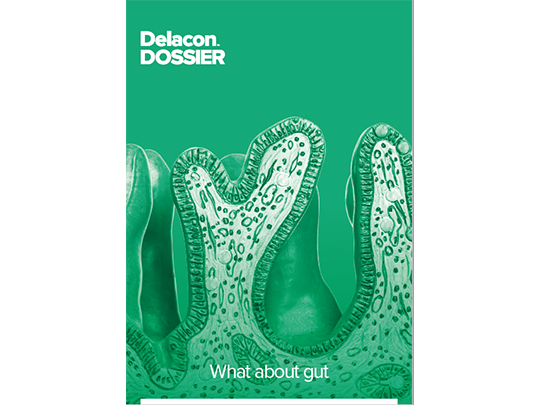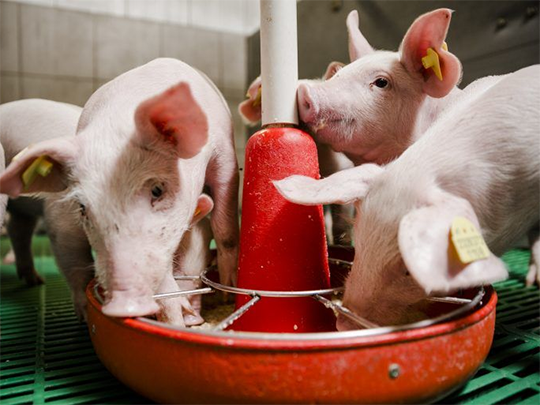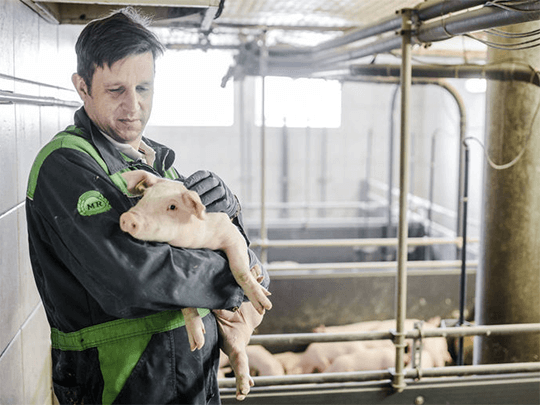The gut as defense line against weaning challenges
The gastrointestinal tract (GIT) is an amazing system that not only allows feed to be digested and nutrients to be absorbed but also is the first line of defense against all threats like xenobiotics, pathogens, etc. It is no surprise if we state that for a good health and growth performance, pigs should beneficially have a healthy and functional gastrointestinal tract. Read more in this article and request our latest Dossier #Whataboutgut

This very interesting and ongoing subject was taken up by our swine team, with the outcome of an exciting article about phytogenics and their ability to support young piglets in one of their most critical phase of life. Take a look at our latest dossier, where you´ll find this previewed article at full length.

Weaning – one of the major challenges in pig production
During the first 10–14 days after weaning, piglets face major challenges. It’s a race against time: the piglet is separated from its mother, put into a new environment with new pen mates and often with less digestible feed. At the same time, its digestive tract and immune system are not yet sufficiently developed to cope with all these stressors. The intestinal mucosa is prone to damage, feed intake can drop and growth rate may decrease.

A promising approach to counter weaning-associated challenges, like a low feed intake, is the supplementation of specific phytogenic feed additives (PFA). Their active ingredients have a wide range of modes of action to support feed intake and maintain the health of piglets in a natural way. In order to counter the multitude of weaning problems, phytogenics and their bioactive ingredients are a valuable tool to support resilience of the piglet post weaning.
The gastrointestinal tract plays a fundamental role in piglets resilience
The gastrointestinal tract (GIT) is an amazing system that not only allows feed to be digested and nutrients to be absorbed but also is the first line of defense against all threats like xenobiotics, pathogens, etc. It is no surprise if we state that for a good health and growth performance, it is beneficial to have a healthy and functional gastrointestinal tract.
“‘Gut health’ is a term increasingly used in the medical literature and by the food industry. It covers multiple positive aspects of the gastrointestinal (GI) tract, such as the effective digestion and absorption of food, the absence of GI illness, normal and stable intestinal microbiota, effective immune status and a state of well-being.“

This definition obviously comes from human medicine. As in humans, pigs “gut health” can be compromised even in the absence of any GIT disease. The low feed intake after weaning for example, means an absence of luminal nutrition. Stressors associated with weaning also cause changes to the structure and function of the GIT. These marked structural and functional modifications in the small intestine may contribute to an intestinal inflammatory status which compromises villous crypt architecture, the epithelial barrier function and disruption of the microbiota (J.R. Pluske 2018). The fundamental role of GIT on the animal’s health and physiological status however goes well beyond just allowing body’s nutrition, good metabolic functions and resilience.
Supporting the intestine means maintaining (production) performance
By promoting feed intake post weaning, damages of intestinal epithelia can be reduced, thus may reduce the incidence of post-weaning diarrhea (PWD). A field trial in Germany at a commercial farm with permanent occurrence of E. coli associated diarrhea supported this thesis. Here, 800 post-weaning barrows and gilts (Danbreed x Pietrain) were allocated randomly to one of two groups, receiving either an unsupplemented feed (control) or the same basal feed supplemented with the phytogenic Fresta® Protect. The addition of the phytogenic feed additive reduced the incidence of PWD by 31 % and usage of medication by 45 % compared to the control group (Figure 1). Thus, research shows the ability of specific phytogenic feed additives to maintain intestinal health of piglets especially during the critical post weaning period.
“To sum up….the support of a healthy piglet from the beginning helps to turn a performer into a high-performer in the immediate and subsequent growth and finishing phase.“
It is obvious that we need to implement novel strategies like phytogenics to support piglets in stressful and challenging post-weaning conditions, especially in antibiotic-free animal production. Simply because a good start of piglets post-weaning may support their entire life performance.

Sandra Chamusco
Global Technical Manager Swine at Delacon Sandra Chamusco has a degree in Animal Science at the University of Évora in Portugal and has been working in swine nutrition for more than 20 years. She was a feed formulator and customer consultant, technical responsible and Director of Operations at the Portuguese subsidiary of the French group CCPA. After that she was Director of Swine Nutrition Department at T.N.A. (Portugal). At Delacon,Sandra is responsible for product development and product support, and for the customer technical services for the complete range of Delacon’s swine products on a global level.










